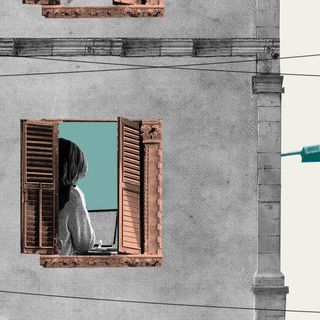One sociological consequence of the pandemic appears to be a surge in listening to older music. A new study confirms this, finding that the lockdown “significantly changed music consumption,” with the “nostalgia effect” peaking roughly 60 days into the implementation of lockdown policies in the different European countries studied.
Published in Covid Economics by the Centre for Economic Policy Research in the UK, a new study analyzed data from almost 17 trillion songs played on Spotify in six European countries — Sweden, the UK, Spain, France, Belgium and Italy. Any music older than three years was categorized as “nostalgic” for the purpose of the study. Interestingly, the study also found that the trend of listening to nostalgic music didn’t correspond to actual spikes in the number of infections. “Demand for nostalgia grew with frustration as the lockdown remained in place, and such a change in behaviour was gradual, but did not react closely to the change of the severity of the pandemic,” the study noted.
According to the study’s author, Timothy Yu-Cheong Yeung, the negative changes caused by the lockdown — curtailed liberties and forced isolation — pushed people towards nostalgic music to escape reality. “One possible way to recover — or to generate positive utility — is to seek nostalgia that reminds people of the good old days,” he said. Experts believe that nostalgia can help us endure change, and create hope for the future. Amid the uncertainty ushered in by the pandemic, “nostalgia [is compensating] for uncomfortable states,” and helping us deal with “feelings of meaninglessness or a discontinuity between past and present,” Dr. Tim Wildschut, professor of social and personality psychology at Southampton University, had explained.
Related on The Swaddle:
Is Crisis Fatigue Leading Us to Avoid the News?
The relationship between music and nostalgia is one that has long intrigued scientists. The music we hear as children, as adolescents, or even during early adulthood, can have a lasting impact on our memory due to a psychological phenomenon called the ‘reminiscence bump.’ “There is evidence that structural elements of music get physically tied to our autobiographical memories. Musical reminiscence bump is so powerful because we attach music to particularly emotional times,” Catherine Loveday, a cognitive neuropsychologist at the University of Westminster, told BBC. And, listening to old music leads to a surge of activity in the reward pathways of our brain, increasing the levels of dopamine and oxytocin, or the feel-good hormones.
Moreover, listening to music can light up the brain’s visual cortex, prompting us to start associating it with memories and images, almost immediately. And, experts believe that music can trigger emotions, to match the emotions we felt, at the time we first heard that music, touting music as “the key to that box” of memories in our brain. Further, memories evoked by music, also relate to phases of our lives, rather than to specific instances — for instance, “the feeling of high school, rather than a specific event; your time with someone rather than a single date.” So, essentially, under lockdown, music is transporting us back to to happier, familiar phases of our lives.
In fact, a British study involving 2,000 people, conducted during the lockdown, reported that people were using nostalgia to generate feelings of happiness, comfort, and relaxation. Further, listening to old music was a nostalgic trigger for 41% of those surveyed. Indians, too, appear to be echoing similar sentiments. “During the lockdown, I have been re-visiting old tracks from the Black & White era to the early 90s,” Prachi Srivastava told The Citizen.
Yeung believes that the relationship between music and nostalgia, which appears to have become more apparent amid the pandemic, is more than a cultural trend, or phenomenon, and can have interesting policy implications too. “Care centres, hospitals, stores, and any places where music could be played publicly should consider the positive effects of playing nostalgic music as a response to the adverse effects of the pandemic,” the study notes.




